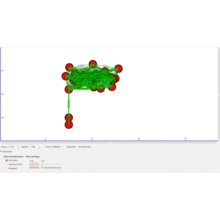Category Archive: 'M.E Network Project'
In this position paper, we propose an unobtrusive solution for improving bonding relations between the elderly and their caregivers, through the Social Hue. The Social Hue is a bidirectional application that is based on the Philips Hue light. To create social presence, activity and emotional states will be detected through sensors and will be transformed into ambient lighting into the elder’s home and […]
There has been a significant increase in recent years in the volume and diversity of streams of data, data streams from sensors, data streams arising from the analysis of content or data mining, right through to user generated Twitter streams. There has been a corresponding increase in demand for more real-time analysis of these streams in […]
We contend that context information of Internet clients can help to efficiently manage a variety of underlying resources for different Internet services and systems. We therefore propose a resource distribution framework that provides quality of experience (QoE) aware service differentiation, which means that starving clients are prioritized in resource allocation to enhance the corresponding end-user’s […]
As miniaturized and high functional sensor devices like smartphones have spread, we can utilize large amounts of sensing data gathered from these devices. Participatory sensing is one of modern sensor-based application models in which users provide their sensing data including their personal data as well as get services. Current models, however, have limitations on flexible data flow based […]
Energy is a scarce resource in wireless communications and mobile networking. In this paper, a novel concept of mobile energy sharing networks is proposed to enhance the energy usage of wirelessnetworks. In such networks, mobile users can share energy with one another when they move and meet, thus minimizing the chances of ending up with insufficient energy for their […]
The growing volumes of time-stamped data available from sensors, social media sources, Web logs, and medical histories present remarkable opportunities for researchers and policy analysts. Although big data resources can provide valuable insights to help us understand complex systems and lead to better decisions for business, national security, cybersecurity, and healthcare, there are many challenges to dealing with […]
Self-organizing dense sensor networks are expected to resolve the challenges of spectral efficiency, energy efficiency, and device management. This paper explores the use of information dependence among sensors to form a community structure of sensor data, and uses this structure to develop an information- centric processing methodology to achieve self-organizing dense sensor networks. Moreover, a data aggregator adopts ℓ1 regularization to easily enhance energy efficiency […]
The Internet of Things (IoT) idea is having a significant impact on our daily lives these days. As the number of IoT devices is growing fast, many researchers have declared that the usage of IoT and the impact of IoT will make people always use IoT devices whatever they do or wherever they are. At […]
While personal information privacy is threatened by online social networks, researchers are seeking for privacy protection tools and methods to assist online social network users. In this paper, we propose a Trust-Aware Privacy Evaluation framework, called TAPE, aiming to address this problem. Under the TAPE framework we investigate how to quantitatively evaluate the privacy risk, as a function of people’s […]
The growing size of cities and increasing population mobility have determined a rapid increase in the number of vehicles on the roads, which has resulted in many challenges for road traffic management authorities in relation to traffic congestion, accidents, and air pollution. Over the recent years, researchers from both industry and academia have been focusing […]

 Click Here to watch our latest output video using NS3 simulator
Click Here to watch our latest output video using NS3 simulator  Click Here to watch our latest projects screenshots using NS3 simulator
Click Here to watch our latest projects screenshots using NS3 simulator